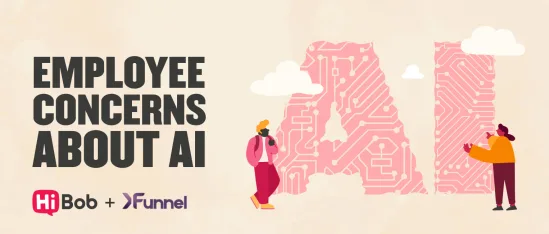By Beeri Amiel, Founder of XFunnel
Here’s the thing about AI in the workplace: while we’re all talking about its potential, our people are living with it every single day. And honestly? They have some pretty important things to say about it.
At XFunnel, we help the world’s biggest brands (such as HiBob) improve how they appear on AI search engines like ChatGPT and Google’s Gemini. I’ve watched this transformation happen in real time. But I wanted to understand what employees were actually thinking, beyond the polished survey responses and corporate feedback sessions.
So we did something different. We analyzed over 500,000 real conversations happening on Reddit, where people share their honest thoughts about work without any filter. What we found wasn’t just interesting—it was eye-opening.
What we analyzed
Think of Reddit as the modern break room conversation. We analyzed posts and comments across communities like r/antiwork, r/WorkReform, r/jobs, and r/cscareerquestions—places where people talk openly about their work experiences.
Using XFunnel’s social listening technology, we identified the themes that came up most often, measured by how much people engaged with them (upvotes and comments). The result? A clear picture of what’s really on employees’ minds about AI at work.
Here’s what we discovered:
10 things employees are actually talking about regarding AI
Recommended For Further Reading
1. “It feels like we’re being watched”: Privacy concerns with AI monitoring
(60,154+ upvotes, 5,330+ comments)
This was the biggest concern by far. Employees are feeling overwhelmed by the constant monitoring—AI tracking keystrokes, analyzing email patterns, even monitoring facial expressions during video calls. People describe feeling like they’re “under a microscope” and worry that they’re being reduced to just data points.
One person put it perfectly: “I feel like I can’t even take a bathroom break without it being tracked somewhere.”
What HR leaders can do: Be transparent about what’s being monitored and why. Create clear policies around AI surveillance and give your people a voice in how these tools are implemented. Consider starting with employee input sessions before rolling out monitoring tools.
2. “Will AI make the rich richer?”: Economic inequality concerns
(32,951+ upvotes, 3,877+ comments)
Employees are genuinely worried about being left behind. They see AI benefiting executives and shareholders while wondering if their own jobs will become less secure or valuable. There’s a real fear of a two-tiered workforce emerging.
What HR leaders can do: Communicate clearly about how AI investments will benefit all employees, not just leadership. Develop upskilling programs that help everyone participate in the AI-enhanced workplace. Consider profit-sharing or bonus structures that ensure AI benefits reach all levels of the organization.
3. “Is AI fair to everyone?”: Bias and discrimination worries
(17,245+ upvotes, 1,957+ comments)
People are concerned about AI systems making unfair decisions, especially in hiring, promotions, and performance reviews. Employees from diverse backgrounds worry about being systematically disadvantaged by algorithms that might not understand different perspectives or working styles.
The “black box” problem is real: employees don’t understand why they were passed over for opportunities, and they feel powerless to appeal algorithmic decisions.
What HR leaders can do: Audit AI tools for bias regularly and be transparent about how AI decisions are made. Create clear appeals processes for AI-influenced decisions. Include diverse voices in AI tool selection and implementation to catch potential blind spots early.
4. “Am I training my own replacement?”: Job displacement fears
(2,831+ upvotes, 2,329+ comments)
While this didn’t get the most engagement, the conversations were intense and detailed. Employees aren’t just afraid of being replaced overnight—they’re watching their responsibilities slowly shift to AI tools. Writers worry about content generation, customer service reps see chatbots taking over, and analysts watch AI handle their data work.
What HR leaders can do: Be honest about which roles might change and invest in retraining programs early. Help your people see how they can work alongside AI rather than be replaced by it. Create new career paths that leverage human creativity and judgment alongside AI capabilities.
5. “Where’s the human touch?”: Creativity and authenticity concerns
(1,272+ upvotes, 683+ comments)
Creative professionals are struggling with feeling like they’re becoming “prompt engineers” instead of true creators. They worry about competing with AI that can generate content instantly and cheaply, and they fear losing the satisfaction that comes from creating something genuinely original.
What HR leaders can do: Emphasize the irreplaceable value of human creativity and perspective. Position AI as a tool that handles routine tasks so humans can focus on higher-level creative work. Celebrate and showcase human-created work alongside AI-assisted projects.
6. “My skills are becoming obsolete”: Adaptation anxiety
(1,547+ upvotes, 726+ comments)
Mid-career professionals especially worry about their hard-earned expertise becoming irrelevant. They’re exhausted by the pressure to constantly learn new AI tools while maintaining their current workload, and they’re not sure if their employers will support this ongoing education.
What HR leaders can do: Provide dedicated time and resources for AI upskilling. Create mentorship programs that pair AI-native employees with experienced workers. Recognize and reward the learning process, not just the end results.
7. “What happens when AI breaks?”: Dependency concerns
(896+ upvotes, 699+ comments)
Employees worry about becoming too reliant on AI systems. They’ve experienced work grinding to a halt when AI tools go offline, and they fear losing fundamental skills as they become dependent on AI for basic tasks.
What HR leaders can do: Maintain backup processes and ensure employees retain core skills even as they adopt AI tools. Create cross-training programs so teams aren’t entirely dependent on any single system. Build redundancy into critical AI-dependent workflows.
8. “Who’s accountable when AI makes mistakes?”: Ethical decision-making
(804+ upvotes, 699+ comments)
People are asking tough questions about AI making decisions that affect human lives and careers. They worry about being asked to implement AI in ways that feel morally questionable, and they want to know who’s responsible when AI makes harmful decisions.
What HR leaders can do: Establish clear ethical guidelines for AI use and create channels for your people to raise concerns. Ensure human oversight remains in place for important decisions. Be transparent about who’s accountable when AI-influenced decisions go wrong.
9. “Is this real or AI-generated?”: Authenticity questions
(354+ upvotes, 157+ comments)
Employees are grappling with distinguishing between human and AI-generated work. They worry about trust, intellectual property, and maintaining professional credibility in a world where it’s getting harder to tell what’s authentically human-created.
What HR leaders can do: Develop clear policies around AI content disclosure and attribution. Train employees on how to identify and properly label AI-assisted work. Create standards for when human-only work is required versus when AI assistance is appropriate.
10. “Can we trust AI to get it right?”: Reliability concerns
(400+ upvotes, 250+ comments)
Employees worry about AI errors, especially in fields where accuracy is critical. They’re concerned about being held responsible for AI mistakes they didn’t catch, and they fear AI errors damaging their professional reputation.
What HR leaders can do: Implement strong quality control processes for AI-generated work. Train your people to effectively review and verify AI outputs. Create clear protocols for handling AI errors and ensure your people aren’t unfairly blamed for system failures.
The opportunity for HR leaders
Here’s what struck me most about these conversations: employees aren’t anti-AI. They’re asking for something much more reasonable—thoughtful implementation that considers their needs and concerns.
This is where HR leaders have an incredible opportunity. You’re uniquely positioned to bridge the gap between technology and humanity in the workplace. You can be the voice that ensures AI adoption happens with empathy, transparency, and genuine care for employee wellbeing.
The companies that will thrive aren’t just the ones with the best AI tools—they’re the ones that implement those tools in ways that make employees feel heard, valued, and empowered.
Your employees are ready for AI. They just want to know you’re ready to listen to them about it.
The technology might be artificial, but the leadership guiding its implementation should always be deeply, authentically human. And that’s exactly the kind of leadership HR professionals are perfectly positioned to provide.

From Beeri Amiel
Beeri Amiel is the founder of XFunnel, an AI search optimization platform that bridges between traditional SEO and AI search for SEO and marketing teams. When he's not decoding the future of search, you'll catch him exploring new tech or brainstorming ways to boost help marketing teams unlock growth.

